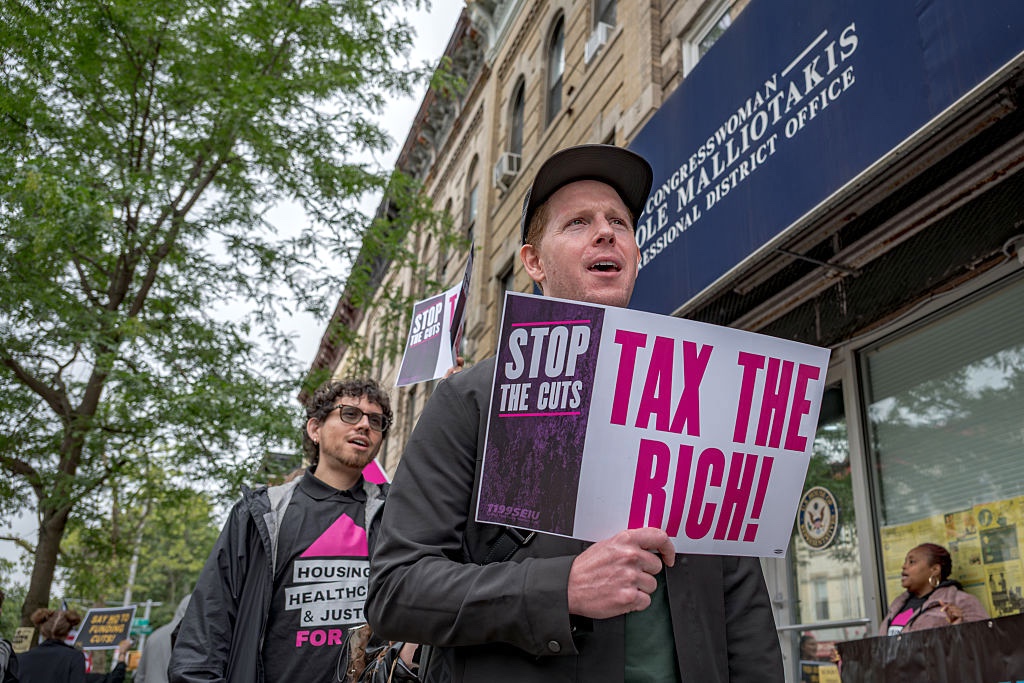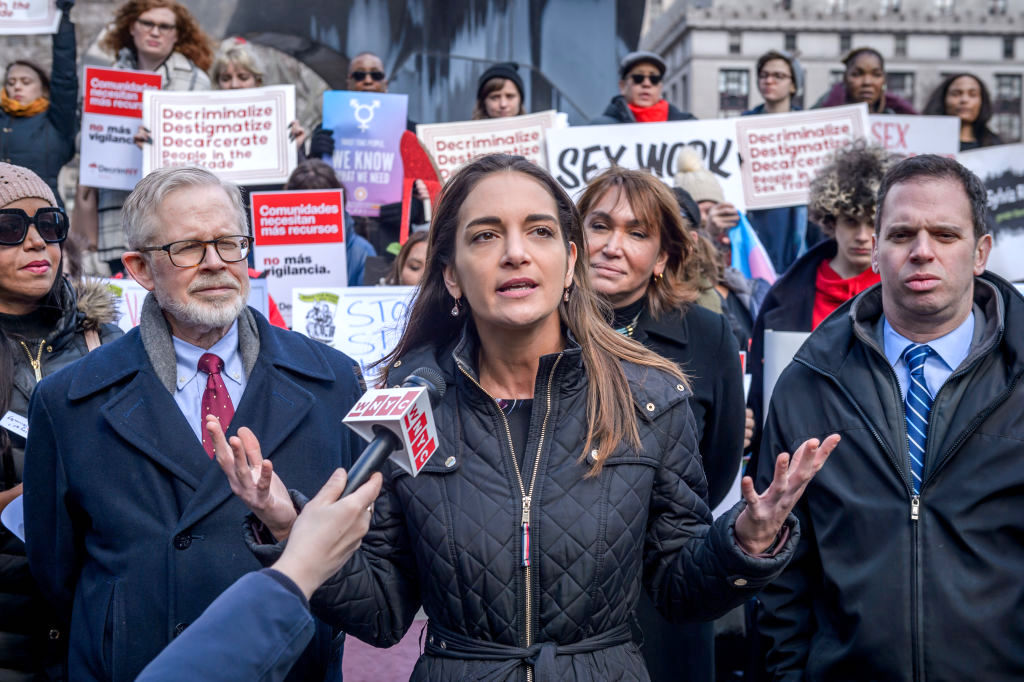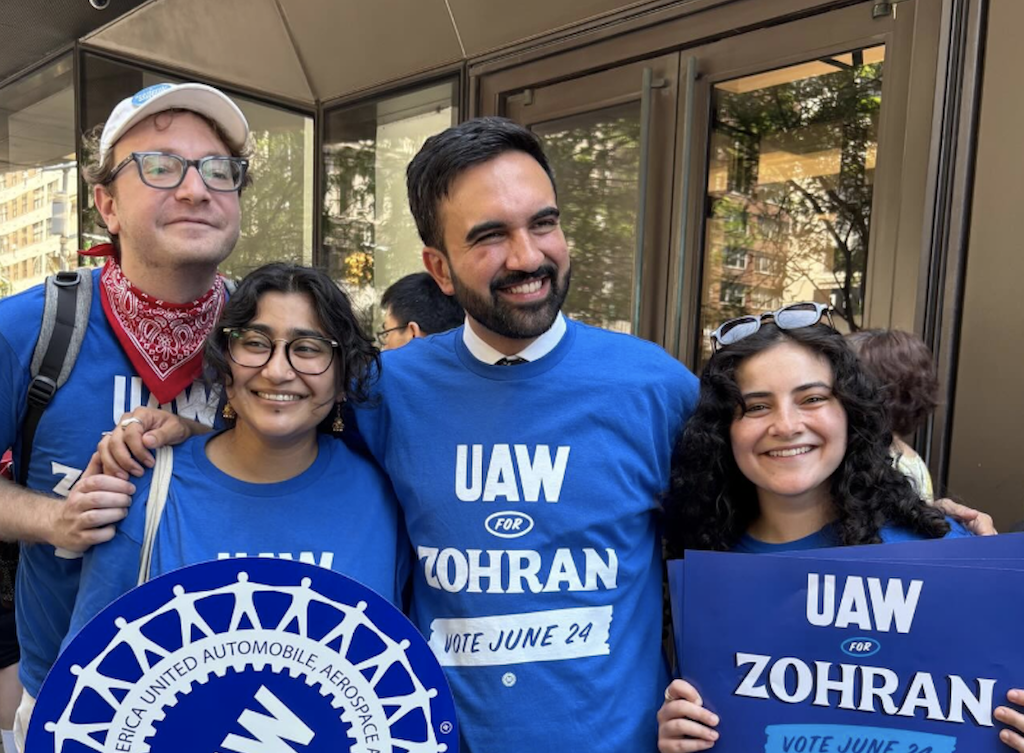The State of New York Has to Tax the Rich
New York City can’t fund many of the robust social programs that Zohran Mamdani has promised in his mayoral run without taxing the rich. And that taxation has to be done at the state level — against a governor who has so far refused to entertain it.

If Zohran Mamdani can’t raise revenue from the state as mayor, he will be left unable to deliver on key pledges. (Erik McGregor / LightRocket via Getty Images)
As Zohran Mamdani has campaigned for New York City mayor, speaking about his platform of fast and free buses, universal child care, and other programs that will make life in New York more affordable, the age-old question hangs over his agenda: “Sounds great, but how is he going to pay for that?”
The answer to that question is “ by taxing the rich.” Simply moving money around in a badly constricted budget isn’t enough; free buses and universal childcare cannot come at the expense of after-school sports or trash pickup.
Take universal childcare, which socialist state senator Jabari Brisport has long pushed for and Mamdani has made a cornerstone of his platform for an affordable New York. Enormous majorities think it’s a good idea, but state leadership wants “someone else to pay for it,” Brisport says. The federal government is one possibility, but that’s obviously a frivolous suggestion while Republicans are running things. Governor Kathy Hochul, instead of putting universal childcare in the state budget this year, set up a task force to determine how to pay for it, which Brisport calls “a waste of time.” He says, “there is only one solution,” and that’s taxing the rich. And that has to happen at the state level because the city has no taxation powers of its own.
That’s why Mamdani, New York City Democratic Socialists of America (NYC-DSA), and others in a coalition of progressive-minded groups in New York City are pushing for a major tax increase on New York’s wealthiest at the state level. The campaign is seen as essential, both to enact Mamdani’s ambitious agenda and to fill gaps in federal funding in the wake of Donald Trump’s Big Beautiful Bill Act, which will devastate and disrupt many crucial services in New York.

As socialist state senator Julia Salazar points out, the state’s health care system relies heavily on Medicaid, which is about one-third of the state’s budget. Hospitals that primarily serve Medicaid patients, like Wyckoff Heights Medical Center in Salazar’s district, were already struggling; Wyckoff has seen layoffs recently. For such hospitals to close would cause a real crisis of care in those neighborhoods.
NYC-DSA and its allies in the Invest in Our New York (IONY) coalition are calling for the legislature to reconvene in its offseason — September and October — to pass new taxes on the rich.
This coalition has successfully organized for increased taxes on the rich before. In 2021, while most people were still indoors as a result of the pandemic and organizing was difficult, they organized New Yorkers to call their legislators demanding taxation for the millionaire class, to fund, among other things, public transit, relief for renters, relief for undocumented workers left out of the federal COVID bill, and full funding of public schools. They won those demands, and the state increased taxes on all New Yorkers earning more than a million dollars a year.
Taxing the rich is popular yet always politically challenging since, as NYC-DSA cochair Gustavo Gordillo points out, the state legislature is full of people who “owe their power and their seats to the billionaire class.” That class and its ideological lackeys in politics and media are already mobilizing against Mamdani and DSA’s plans.
Governor Hochul has bluntly made clear that she is not open to taxing the rich. “I don’t want to lose any more people to Palm Beach,” she has said. Conservatives and business interests, too, have been recycling the same canard that rich people and businesses will leave New York City if their taxes are increased — always a real possibility but one that’s highly exaggerated by the wealthy as they seek to avoid taxation.
The stakes are high for Mamdani and DSA, and for the future of left politics. As Waleed Shahid recently wrote, reflecting on the struggles of progressive Chicago mayor Brandon Johnson after taking office, it’s critical to remember that the opposition “won’t wait for failures, it will create them.”
Unkept promises — even if they are entirely the fault of the mainstream Democrats and Donald Trump — won’t be forgiven, and if Mayor Mamdani can’t raise revenue from the state, he will be left unable to deliver on key pledges. If life for working-class New Yorkers gets even harder, which could happen given the scope of federal cuts, he may be blamed, and the situation could become illustrative of why “socialism” doesn’t work.
That said, Gordillo and many in DSA are optimistic. Having won this demand before, in a time of weakened organizing capacity and less enthusiasm for socialism than New Yorkers have now, NYC-DSA is going into this campaign with some strength. Compared to 2012, Albany is a “friendlier atmosphere” to redistributive demands, Salazar says, partly because DSA has a bigger bench there after having elected more legislators (now nine counting Mamdani) — and also, she notes, more buy-in from organized labor.

While unions need to get much more visible in the current Tax the Rich campaign and the IONY coalition, many have endorsed Mamdani and, throughout this past budget season, the New York State United Teachers, Communication Workers of America, New York State Nurses Association, United Auto Workers, and many others advocated for increasing taxes on billionaires. Salazar believes New York City’s unions will be a powerful force in pushing the “tax the rich” demand this time. Then there’s the high profile of the socialist movement’s new tribune; this time around, says Brisport, after November’s election, the socialists will have “our new Mayor Mamdani using his pulpit.”
The “tax the rich” forces will enjoy a mandate from Mamdani’s primary victory. The Mamdani campaign has mobilized 50,000 volunteers — a corps that will surely grow throughout the course of the general election — who can organize pressure on legislators. As Gordillo points out, 2026 will be an election year for the governor and other Democrats. Governor Hochul has a challenger from her left, lieutenant governor Antonio Delgado, who recently led a climate march over the Brooklyn Bridge demanding that the governor “stand up to Trump” on fossil fuels. NYC-DSA has demonstrated its power, putting real teeth on its threats to primary uncooperative elected officials. NYC-DSA’s organizing, Gordillo says, will be coordinated with an electoral strategy against legislators who resist taxing the rich.
Some establishment Democrats, he says, view the coming austerity as a lesson for voters, feeling that “the general public needs to experience the pain of the Trump cuts” so they learn not to vote for Republicans. It’s an appalling way to look at the devastation of America’s social safety net. But those Democrats may have to experience some painful lessons of their own on the way to achieving new revenue to fund desperately needed social programs in New York.